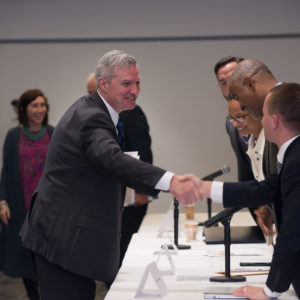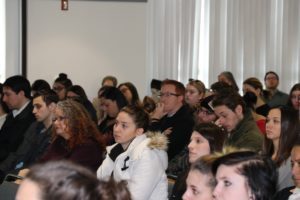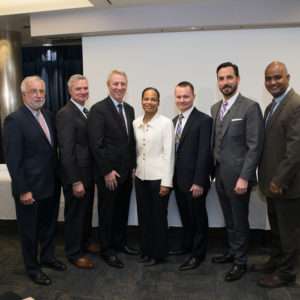A panel of distinguished local educators participated earlier this month in SJC Long Island’s panel discussion, “The Future of Education Policy,” discussing trends in education on both the national and local level and how they are impacting students and their families.
The six educators, including St. Joseph’s College President Donald R. Boomgaarden, Ph.D., and Timothy McNiff, superintendent of schools for the Archdiocese of New York, addressed the challenges that teachers and school administrators face with education policy, in an age when the importance of education has never been more apparent.
Dr. Boomgaarden, cited the “learned ministry,” a Jesuit concept that calls upon educators to apply their knowledge to develop whole people and leave behind something meaningful. Only through this, he said, “can we understand why we became teachers and how we can reach into the world and transform it for the better.”

SJC President Donald R. Boomgaarden, Ph.D.
Visiting Professor and former U.S. Congressman Tim Bishop organized the education policy forum to keep the College’s many aspiring teachers, as well as the local community, informed about changes in pedagogy and educational policy. More than 100 students, faculty and members of the community attended the event, held in the McGann Conference Center.
Dr. Michael Hynes, Ed.D., superintendent of schools for the Patchogue-Medford School District, covered the shortcomings of a content-heavy, testing-driven curriculum. He emphasized the superior outcomes borne from more innovative approaches that focused on individual thinking and empathy.
Likewise, the inadequacies of some public schools, particularly as they impact low-income communities, was discussed by Dr. Shawn Robertson, associate professor of child study at SJC Long Island, when he presented the model of charter schools as an enterprise that has enjoyed success (as well as setbacks) in advancing the needs of low-income learners.
Dr. LaQuita Outlaw, principal of Bay Shore Middle School, asked, “We have different cultures in our schools; what are we doing to welcome them?” and then shared with the audience her comprehensive approach to integrating parents into the learning community.

“The role of teachers are not simple and staid; they are constantly being pulled in different directions,” noted Dr. Joseph Lemke ’04, an SJC alum and director for social studies at Bay Shore School District. “Any meaningful educational reforms must acknowledge this, reinforce and support teachers first.”
Despite the challenges presented by certain policies, the value of central tenets of education espoused by generations of faculty at St. Joseph’s to thousands of students over the decades still bore true – faith, family, and the importance of the teacher – across the discussion.
Dr. McNiff stressed this as he discussed how the Catholic approach to education, with an emphasis on faith, excellence, and family commitment, have led to remarkable rates of college attendance and graduation among low-income minority populations.

